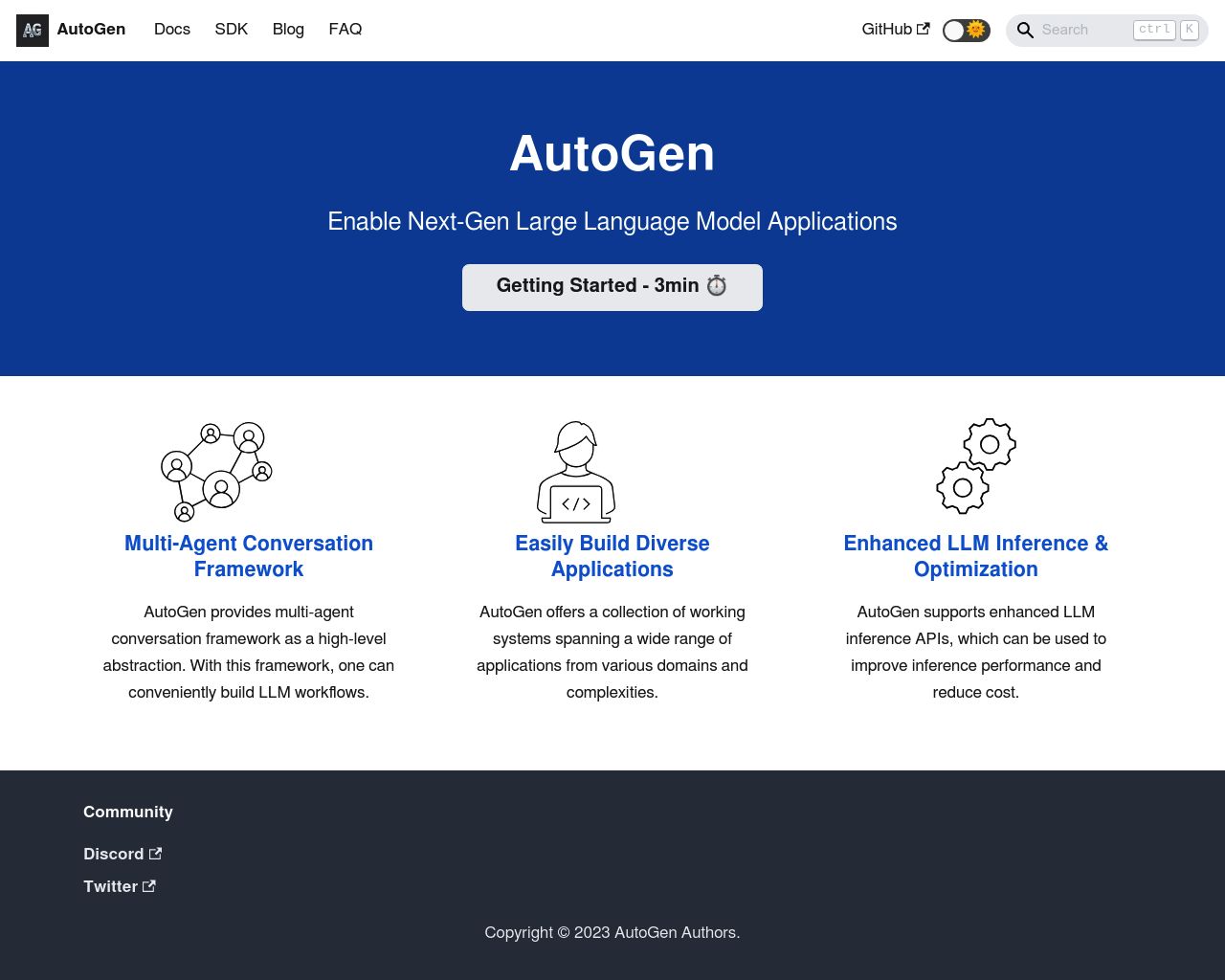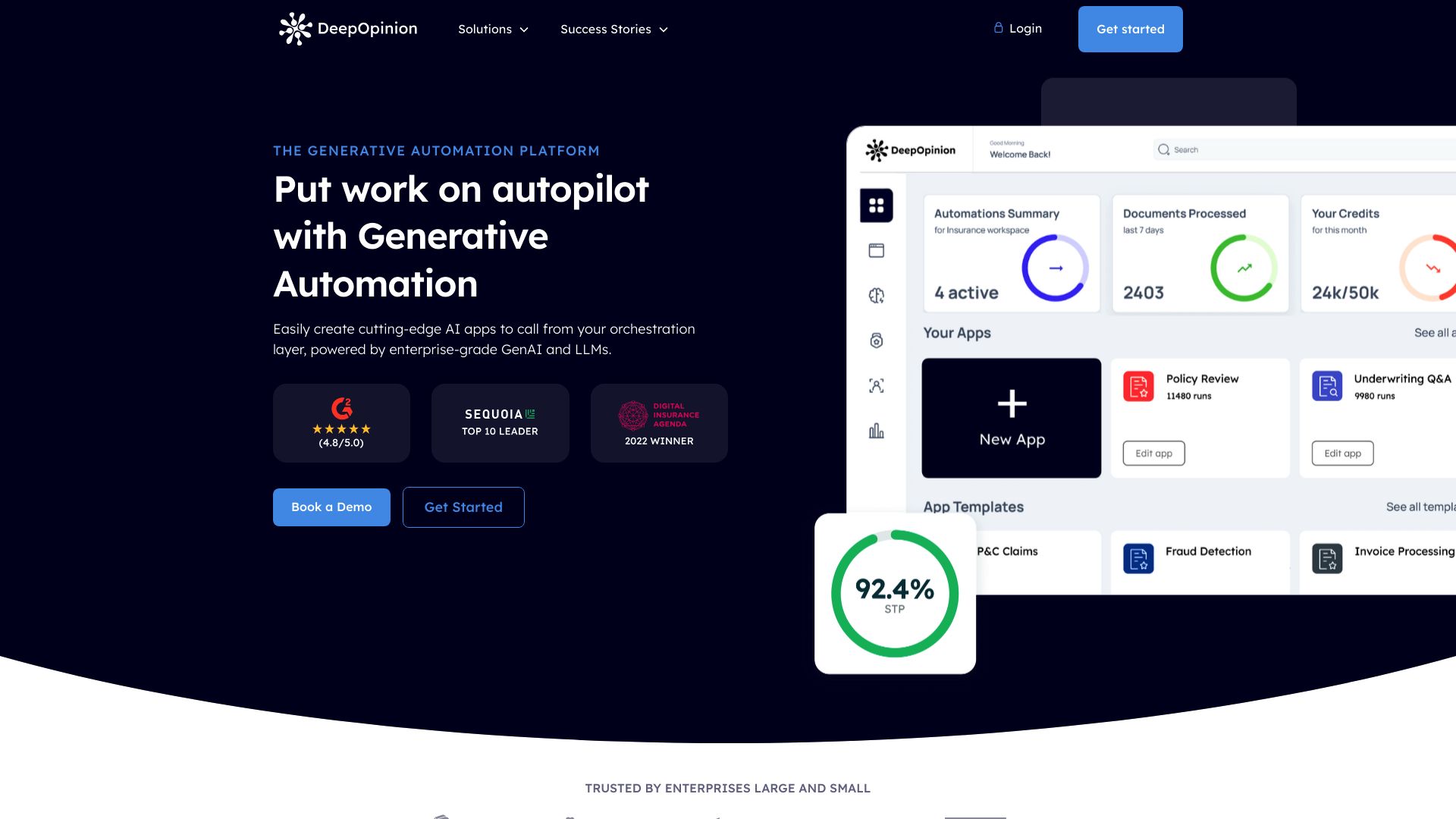AutoGen vs. DeepOpinion: AI Tool Comparison
AI technology reshapes industries and redefines business capabilities daily. AutoGen vs. DeepOpinion, and SmythOS represent the cutting edge of AI agent development and deployment. This comparison delves into their unique approaches, exploring how each platform empowers users to harness AI’s potential. We’ll examine their core strengths, limitations, and standout features to help you determine which solution best aligns with your organization’s AI ambitions. Whether you’re a developer seeking advanced customization, a business user looking for no-code simplicity, or an enterprise requiring a versatile AI ecosystem, this analysis will guide you through the key considerations for selecting the ideal AI platform.
AutoGen Overview
AutoGen empowers developers to create sophisticated Large Language Model (LLM) applications through multi-agent conversations. This open-source framework enables customizable agents to interact with each other, LLMs, tools, and humans to tackle complex tasks.


AutoGen’s core strength lies in facilitating autonomous multi-agent conversations. These agents collaborate to perform tasks independently or with human input, adapting to diverse use cases. The framework maximizes LLM performance through enhanced inference capabilities, including tuning, caching, error handling, and templating. This optimization proves crucial when working with resource-intensive models like ChatGPT and GPT-4.
AutoGen empowers developers to create sophisticated Large Language Model (LLM) applications through multi-agent conversations.
Developers can tailor agents to specific needs, integrating LLMs, human inputs, and various tools. AutoGen supports both fully autonomous operations and human-in-the-loop problem-solving, offering flexibility for applications requiring human oversight. The framework has demonstrated effectiveness across a wide range of applications, from automated task solving and code generation to complex problem-solving in group chats.
For developers, AutoGen provides essential debugging tools and logging functionalities for API calls, facilitating diagnosis and optimization of LLM-based systems. The inclusion of EcoOptiGen, a cost-effective technique for tuning large language models, underscores AutoGen’s commitment to enhancing LLM efficiency and effectiveness.
While AutoGen offers powerful capabilities, it requires coding skills for setup and lacks a visual builder or no-code editor. This may present a hurdle for non-technical users seeking to leverage its advanced features. Additionally, the framework’s focus on code-based configuration might limit its accessibility for those preferring visual or no-code development environments.
DeepOpinion Overview
DeepOpinion offers a no-code AI automation platform designed for businesses seeking to streamline cognitive processes. The company’s flagship product, DeepOpinion Studio, empowers users to create sophisticated AI applications without programming expertise. This platform excels in processing unstructured data from various sources, making it valuable across multiple business functions.
The core strength of DeepOpinion lies in its AutoML engine, which simplifies model training and delivers high-precision results with minimal data requirements. This proprietary technology sets DeepOpinion apart, allowing users to achieve human-level accuracy while reducing the need for extensive training datasets by up to 90%.
DeepOpinion offers a no-code AI automation platform designed for businesses seeking to streamline cognitive processes.


Flexibility is a key feature of DeepOpinion’s offering. The platform supports multiple deployment options, including cloud-SaaS, private cloud, hybrid setups, and on-premise solutions. This versatility allows businesses to choose the deployment method that best aligns with their infrastructure and security requirements. Additionally, DeepOpinion boasts extensive integration capabilities, connecting seamlessly with over 150 systems and enterprise applications such as Microsoft Outlook, MS Dynamics, and SAP.
The platform supports multiple deployment options, including cloud-SaaS, private cloud, hybrid setups, and on-premise solutions.
One potential drawback of DeepOpinion is its focus on business users, which may limit its appeal to developers seeking more granular control over AI models. While the platform’s ease of use is a significant advantage for non-technical users, it may not provide the level of customization that some technical teams require for highly specialized applications.
DeepOpinion’s vision centers on democratizing AI technology, making it accessible and usable without extensive coding knowledge. By providing a comprehensive, user-friendly platform, the company aims to enable businesses to leverage AI for enhancing efficiency and productivity across various workflows and decision-making processes. This approach positions DeepOpinion as a valuable tool for organizations looking to integrate AI into their daily operations without the need for extensive technical resources.
Feature Comparison
AutoGen and DeepOpinion offer distinct approaches to AI agent development, with notable differences in their core components and security features. AutoGen provides a flexible framework for creating multi-agent systems, emphasizing customization and collaboration between AI agents. Its strength lies in facilitating complex interactions and problem-solving capabilities through agent conversations. However, AutoGen lacks a visual builder or no-code editor, requiring coding skills for setup and configuration.
In contrast, DeepOpinion focuses on providing a no-code AI automation platform, making it more accessible to business users without extensive programming knowledge. DeepOpinion’s AutoML engine simplifies model training and delivers high-precision results with minimal data requirements.
This approach significantly reduces the barrier to entry for AI implementation in business processes. However, DeepOpinion’s platform may offer less granular control over AI models compared to AutoGen, potentially limiting its appeal to developers seeking more advanced customization options.
Security features also differentiate these platforms. While both support OAuth for API authentication, DeepOpinion emphasizes enterprise-grade security measures, including robust data encryption and comprehensive user and infrastructure security. AutoGen’s documentation doesn’t explicitly mention advanced security features like constrained alignment or data encryption, which may be a consideration for organizations with stringent security requirements.
Feature Comparison Table
| AutoGen | DeepOpinion | SmythOS | |
|---|---|---|---|
| CORE FEATURES | |||
| Visual Builder | ❌ | ✅ | ✅ |
| No-Code Options | ❌ | ✅ | ✅ |
| Explainability & Transparency | ✅ | ❌ | ✅ |
| Multimodal | ✅ | ❌ | ✅ |
| Human-AI Interaction | ✅ | ❌ | ✅ |
| Agent Work Scheduler | ❌ | ❌ | ✅ |
| SECURITY | |||
| Constrained Alignment | ❌ | ✅ | ✅ |
| Data Encryption | ✅ | ❌ | ✅ |
| IP Control | ❌ | ❌ | ✅ |
| COMPONENTS | |||
| Zapier APIs | ✅ | ❌ | ✅ |
| All other APIs, RPA | ✅ | ❌ | ✅ |
| Data Lakes | ❌ | ✅ | ✅ |
| DEPLOYMENT OPTIONS (EMBODIMENTS) | |||
| Staging Domains | ❌ | ✅ | ✅ |
| Production Domains | ❌ | ❌ | ✅ |
| API Authentication (OAuth + Key) | ✅ | ❌ | ✅ |
| Deploy as Site Chat | ✅ | ❌ | ✅ |
| Deploy as Scheduled Agent | ❌ | ❌ | ✅ |
| Deploy as GPT | ✅ | ❌ | ✅ |
| Scalability | ✅ | ❌ | ✅ |
| DATA LAKE SUPPORT | |||
| Hosted Vector Database | ❌ | ✅ | ✅ |
| Sitemap Crawler | ❌ | ❌ | ✅ |
| YouTube Transcript Crawler | ❌ | ❌ | ✅ |
| URL Crawler | ✅ | ❌ | ✅ |
| PDF Support | ✅ | ❌ | ✅ |
Best Alternative to AutoGen and DeepOpinion
SmythOS stands out as the superior alternative to AutoGen and DeepOpinion for AI agent development. Our platform combines powerful capabilities with unparalleled ease of use, empowering users to create sophisticated AI solutions without extensive coding knowledge. SmythOS offers a visual drag-and-drop interface that streamlines the building process, allowing rapid prototyping and deployment of AI agents. Unlike AutoGen’s code-heavy approach or DeepOpinion’s limited customization options, we provide the flexibility to craft tailored solutions while maintaining accessibility for non-technical users.
SmythOS stands out as the superior alternative to AutoGen and DeepOpinion for AI agent development. Our platform combines powerful capabilities with unparalleled ease of use…
SmythOS excels in its extensive integration ecosystem, supporting connection to a vast array of APIs, AI models, and tools. This versatility ensures our platform can adapt to virtually any workflow or business process. We offer pre-built components and templates that significantly reduce setup time, enabling users to focus on innovation rather than implementation details. Our multi-agent orchestration capabilities surpass competitors, facilitating collaborative AI systems that can tackle complex tasks with greater efficiency.
SmythOS’s deployment options span various platforms, including major cloud providers and popular AI interfaces, ensuring seamless integration into existing technology stacks. Security remains a top priority, with robust features like data encryption and constrained alignment to safeguard sensitive information and ensure ethical AI use. The platform’s scalability supports enterprise-level deployments while maintaining performance, addressing a critical need for growing businesses. By choosing SmythOS, users gain access to a comprehensive AI development environment that combines cutting-edge technology with user-centric design, making advanced AI functionalities accessible and manageable for organizations of all sizes.
Conclusion
AutoGen, DeepOpinion, and SmythOS each offer unique approaches to AI agent development and deployment. AutoGen excels in facilitating multi-agent conversations and problem-solving, ideal for developers seeking advanced customization. DeepOpinion provides a user-friendly, no-code platform for business users, simplifying AI automation for various workflows. However, SmythOS emerges as the standout solution, combining the strengths of both while addressing their limitations.
SmythOS offers unparalleled versatility with its drag-and-drop interface, extensive integration ecosystem, and support for multiple AI models. Unlike AutoGen, it doesn’t require coding skills, making it accessible to both technical and non-technical users. SmythOS surpasses DeepOpinion in flexibility, offering more granular control and a wider range of deployment options, from APIs to chatbots and scheduled agents.
The platform’s multi-agent orchestration, versatile deployment options, and robust security features position SmythOS as the superior choice for businesses seeking to leverage AI effectively. Its ability to create once and deploy anywhere streamlines the development process, while the extensive library of pre-built components and templates accelerates implementation.
For organizations looking to harness the full potential of AI, SmythOS provides the ideal balance of power, flexibility, and ease of use. Explore SmythOS’s diverse range of AI-powered agent templates to jumpstart your AI journey, or create a free SmythOS account to experience firsthand how it can revolutionize your approach to AI development and deployment.
Last updated:
Disclaimer: The information presented in this article is for general informational purposes only and is provided as is. While we strive to keep the content up-to-date and accurate, we make no representations or warranties of any kind, express or implied, about the completeness, accuracy, reliability, suitability, or availability of the information contained in this article.
Any reliance you place on such information is strictly at your own risk. We reserve the right to make additions, deletions, or modifications to the contents of this article at any time without prior notice.
In no event will we be liable for any loss or damage including without limitation, indirect or consequential loss or damage, or any loss or damage whatsoever arising from loss of data, profits, or any other loss not specified herein arising out of, or in connection with, the use of this article.
Despite our best efforts, this article may contain oversights, errors, or omissions. If you notice any inaccuracies or have concerns about the content, please report them through our content feedback form. Your input helps us maintain the quality and reliability of our information.
